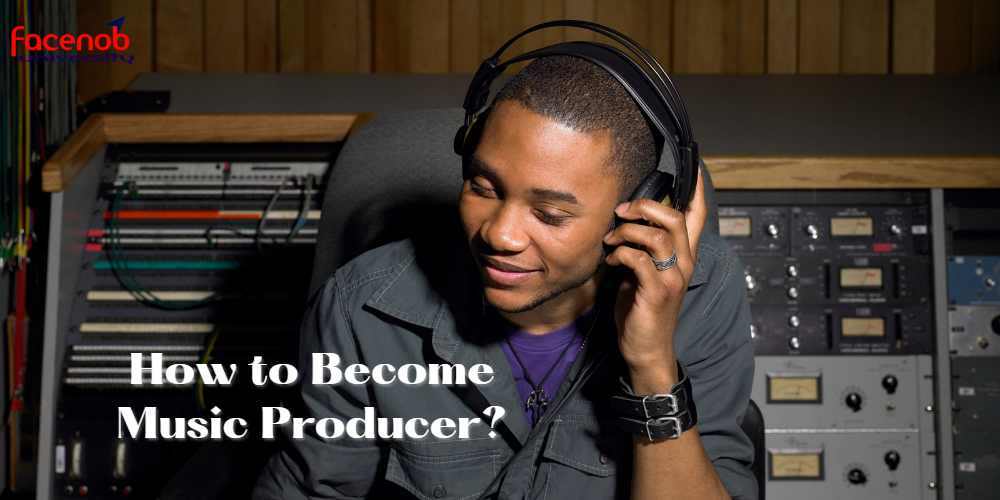How to Become a Music Producer?

Introduction of Music Producer
Music producers are similar to coaches in that they instil strong work habits and faith in their artists in order to get the most out of them. Honorary band members wear various hats to transform music into art; they listen to, experiment with, and investigate all areas of music in order to produce an album or a record.
Similar Job Titles
- Beat Maker
- Producer
- Record Producer

Typical Job Responsibilities
What do Music Producers do?
A Music Producer would typically need to:
- Study music and production
- Listen to a large amount of music gathered through effective networking and analyze the masterpieces.
- Performer auditions, music selection, and booking compatible vocalists and/or session musicians are all examples of creative decisions.
- Schedule studio time to conduct recording sessions, alter compositions, or suggest lyrics modifications.
- Handle funding, costs, and negotiations
- By explaining difficult musical principles in simple ways, you can help to mix, master, and record professionals.
- Ensure that artists and investors share the same vision for each track/album in terms of vocals, sound effects, and instrumental arrangements and that any creative conflicts are resolved diplomatically.
- Oversee the post-production process, which includes music editing and ensuring that the project does not exceed budget or schedule limits.
- Think like a consumer to keep a fresh view of the productions.
Standard Work Environment
In-house music producers work for specialized studios, whilst freelancers are hired by bands or record companies on their behalf. The majority of their working hours are spent within the studios. They travel a lot to meet with clients. Outside of the studio, there is a lot of work to be done, such as attending rehearsals, meetings, writing sessions, and going to shows. Unless otherwise noted, the dress code is business casual.
Work Schedule
Music Producers normally work 10-12 hours a day in the studio. They devote time to phone calls, emails, texts, social media, and even accounting. The norm is irregular hours.
Employers
Music Producers are typically self-employed and may find work in concerts, albums, films, or video games.
Music Producers are generally employed by:
- Record Labels
- Music Bands
Unions / Professional Organizations
Registration with a Publishing Rights Organisation (PRO) benefits new music producers by raising awareness regarding authorship and publishing royalties collecting. Community and networking are essential for success.
Workplace Challenges
Constant stress as a result of fierce job competition, erratic work hours, and long periods of time with no workflow
High pay paid by very few top-of-the-ladder producers
Suggested Work Experience
Music producers may begin their careers as studio engineers and/or session musicians. Experience in recording engineering is beneficial. Recent technical advancements allow you to obtain relevant expertise on your home PCs by using recording and mixing tools.
There are coveted internship positions available with record labels where you can shadow well-known music industry experts.
Recommended Qualifications
Learn as much as you can about various music genres, such as classical, country, opera, pop/rock, and jazz. Aspiring Music Producers will benefit from specialized bachelor’s programmes in Music Production and Recording Arts or Engineering, Music Business, Sound Recording Technology, Music Studies, Fine Arts in Recording Technology, Music Industry, or Music Technology.
Certifications, Licenses, and Registration
Specialized academic credentials that encompass standard technologies used in music production | industry-specific management approaches | practical experience or observation at an affiliated recording studio are in high demand. Instead of a four-year degree, you could pursue online certification.
Projected Career Map
Music Production is the highest level of employment in this field. Music Producers may only progress by expanding and diversifying their skill set, working with more prominent musicians, and increasing their charge. Some start their careers in a home studio before gaining recognition and being requested to work on big-budget projects.
Job Prospects
Because there are so many people interested in working in this industry, expect tough competition for positions. Full-time music director and composer roles will be highly competitive. Candidates with extraordinary musical talent and dedication should be given priority.
Beneficial Professional Development
The only way to increase your skill set is through experience and hands-on knowledge. Courses in communication and psychology might also help you improve your people skills.
A master’s degree in music business, technology, or production may also provide the essential expertise and responsibilities. Most Music Producers began as musicians, which might help them understand the industry better.
Conclusion of Music Producer
Music production necessitates a wide range of abilities and places enormous strain on the incumbent. However, no one ever learned by standing in the shallow end; to prove oneself as more than a one-hit wonder, one must be enthusiastic about songs, have an ear for good music, have strong business acumen, and sample the deep end to be inspired in creative ways!
Advice from the Wise
Building solid work habits and trust is similar to that of a coach. You want to get to the point where you can say and discuss anything. There must be a genuine relationship with the artist.
Explore Also: How to Become a Music Engineer?

https://melbetng.com/
https://avenue18.ru/
https://melbetbdofficial.com/
https://profile.hatena.ne.jp/rentcarfycom/
проститутки достоевская
индивидуалки города челябинска
шлюхи иркутск по вызову
все проститутки иркутска
иркутские шлюхи
https://dzone.com/users/5155937/roscaral.html
Very interesting information!Perfect just what I was looking for!Leadership